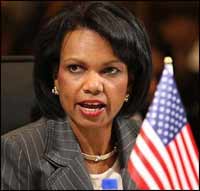USA exercises double standards again
The USA proudly displays its double standard policies to the whole world. This time the selective approach to international issues touches upon the recognition of small republics. Having recognized Kosovo, the US administration looks right through the similar right of the republic of South Ossetia. The US Department of State continues to emphasize the uniqueness of the “Kosovo phenomenon.”

US Secretary of State Condoleezza Rice has recently released a statement on South Ossetia. Speaking about a possibility for this Caucasian republic to declare independence, Mrs. Rice strongly rejected a similarity between its sovereignty and the Kosovo problem.
While on her way to Brussels, Belgium, US Secretary of State Condoleezza Rice was asked by a journalist if she thought that South Ossetia's independence was inevitable.
"It’s not going to happen," snapped Condoleezza Rice, cutting short the dreams and hopes of freedom which are shared by the South Ossetians.
"I don’t want to try to judge the motives, but we’ve been very clear that Kosovo is sui generis and that that is because of the special circumstances out of which the breakup of Yugoslavia came," added the Bush-appointed official before again repeating that "it’s a special circumstance,” she said.
South Ossetia was an autonomous oblast of Georgia in Soviet times. The majority of the territory including the capital of Tskhinvali is administered by the government of the de facto independent South Ossetian Republic, which declared independence from Georgia. South Ossetia's declaration of independence is not recognised by any country. However, parts of eastern and southern South Ossetia are controlled by the Georgian government. Georgia does not recognize South Ossetia as a distinct or independent entity. However in April of 2007, the Georgian government created a temporary administrative unit (Provisional Administrative Entity of South Ossetia) headed by ethnic Ossetians (former members of separatist government) which would enable Tbilisi to administer the region through local leaders, negotiate with Ossetian authorities regarding its final status and conflict resolution.
The United Nations, European Union, OSCE, Council of the European Union, NATO and most of the countries around the world recognize South Ossetia as an integral part of the Georgian state and its constitution. However, the de facto independent republic governed by the secessionist government has held a second independence referendum on November 12, 2006, after its first referendum in 1992 was not recognized by the international community as valid. As expected the referendum turned out a majority for independence from Georgia. However, it was not recognized internationally by the UN, European Union, OSCE, NATO and the Russian Federation, given the lack of ethnic Georgian participation and the legality of such referendum without recognition from the central government in Tbilisi.
Translated by Dmitry Sudakov
Pravda.ru
Subscribe to Pravda.Ru Telegram channel, Facebook, RSS!





